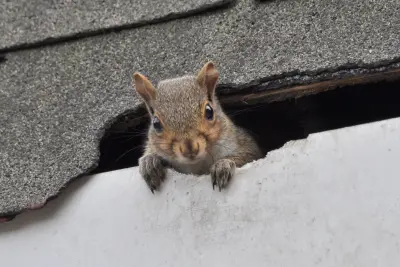
As temperatures drop, pests such as rodents and spiders seek refuge indoors, attracted by the warmth, food, and shelter your home provides. These uninvited guests can quickly become a nuisance if left unchecked. By understanding their behaviors and typical entry points, you can keep them from invading your space. Taking preventive action now can spare you the hassle of winter infestations.
Why Pests Seek Shelter Indoors in Winter
In autumn and winter, as outdoor food sources become scarce, pests are more likely to seek shelter indoors. They’re often attracted to undisturbed parts of the home, which can explain strange sounds coming from the attic or basement. Beyond being bothersome, rodents pose health risks by spreading diseases like hantavirus and salmonella, damaging structures by chewing and contaminating food supplies. With the drop in temperature, your home becomes a cozy refuge with warmth, safety, and easy access to food.
Which Pests and Rodents Could Be Hiding in Your Home?
Rats, mice, and squirrels are common pests during the winter, but depending on your location, you might also encounter cockroaches, spiders, raccoons, possums, or bats trying to find warmth indoors. Rodents are especially adept at breaking in, as mice can fit through gaps as small as a pencil’s width, while rats can squeeze through holes that match the size of their heads. Their climbing skills enable them to scale pipes, walls, and downspouts, so sealing all small openings is essential to prevent these intruders.
How Quickly Can a Rodent Infestation Spread?
Once indoors, even a few rodents can turn into a significant infestation very quickly. Mice and rats are prolific breeders, and with a cozy nesting spot, their numbers can grow exponentially. A single pair of rats could result in over 1,000 offspring within a year, and female mice can have up to 10 litters annually, with young maturing in just 4-6 weeks. A small rodent issue can rapidly become a much bigger problem.
How to Detect a Pest Infestation Early
If you think pests might be invading, keep an eye out for evidence such as droppings, nests, and chew marks, especially in seldom-used spaces like attics, basements, or behind appliances. The sounds of scratching in the walls, small footsteps, or strange odors from concealed areas can also indicate a rodent presence. Rodents typically damage materials by shredding paper, cardboard, and insulation for nesting, and their chewing can impact wiring and wooden parts of your home, potentially weakening its structure. Getting professional pest control help is advisable at the first sign of rodent activity.
Winter Pest Prevention Tips for Key Areas in Your Home
Winter is coming, and a few preventative steps can go a long way in keeping pests out of your home. Follow these essential tips to secure vulnerable areas and avoid uninvited visitors this season:
- Basement: Basements become a prime target for rodents and other pests seeking warmth and shelter from the cold outdoors.
- Kitchen: Kitchens are a magnet for pests due to the abundance of food sources, including crumbs, leftovers, and uncovered food. Keep your kitchen pest-free by promptly cleaning spills, wiping down surfaces, disposing of trash daily, and storing food in airtight containers.
- Garage: To keep rats, mice, and other pests out of your garage, seal any external gaps and ensure all entryways to your home are properly sealed. Store items in plastic bins to avoid providing food or nesting materials for pests.
- Attic: Rodents are drawn to attics for their warmth and dryness. Prevent them from invading by securing electrical wires, repairing any roof damage, and using plastic bins for storage instead of cardboard, which can attract pests.
Pest Hotspots Outside of Your Home
Pest activity isn’t confined to the interior of your home. Your home’s exterior can attract pests eager to find a way inside. Here are some critical outdoor areas to check and secure before pests seek shelter this winter:
- Garden: Keep compost in a tightly sealed container to prevent attracting pests. Regularly clear debris, remove waste, and trim shrubs or tree branches near the house to minimize pest access.
- Outdoor Bins: Don’t overfill outdoor bins, as excess waste can draw pests like rats, mice, and flies. Make sure the lids fit securely to prevent pests from entering and nesting in your trash.
- Air Vents: Check that vent covers are securely installed and intact to prevent rodents and other pests from using them as entry points into your home.
- Gutters and Downpipes: Clean gutters and downpipes regularly to remove debris, as this can attract rodents looking for food or nesting materials.
Why Professional Pest Control Is Essential
Prompt action is crucial when dealing with a rodent or pest issue to prevent damage and health concerns. A professional exterminator provides effective pest control, whereas DIY methods may not completely resolve the problem. Professionals also have the expertise to identify hidden entryways and develop strategies for long-lasting prevention.
Reach out to Batzner Pest Control for a professional pest inspection to safeguard your home and family.
Need a pest control estimate?
We'll call you! Our representatives are fast and friendly.
Preventing Winter Pests from Entering Your Home in Wisconsin
Serving Wisconsin





